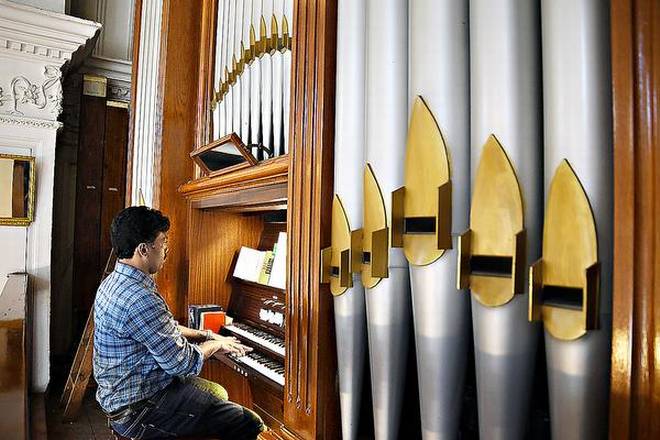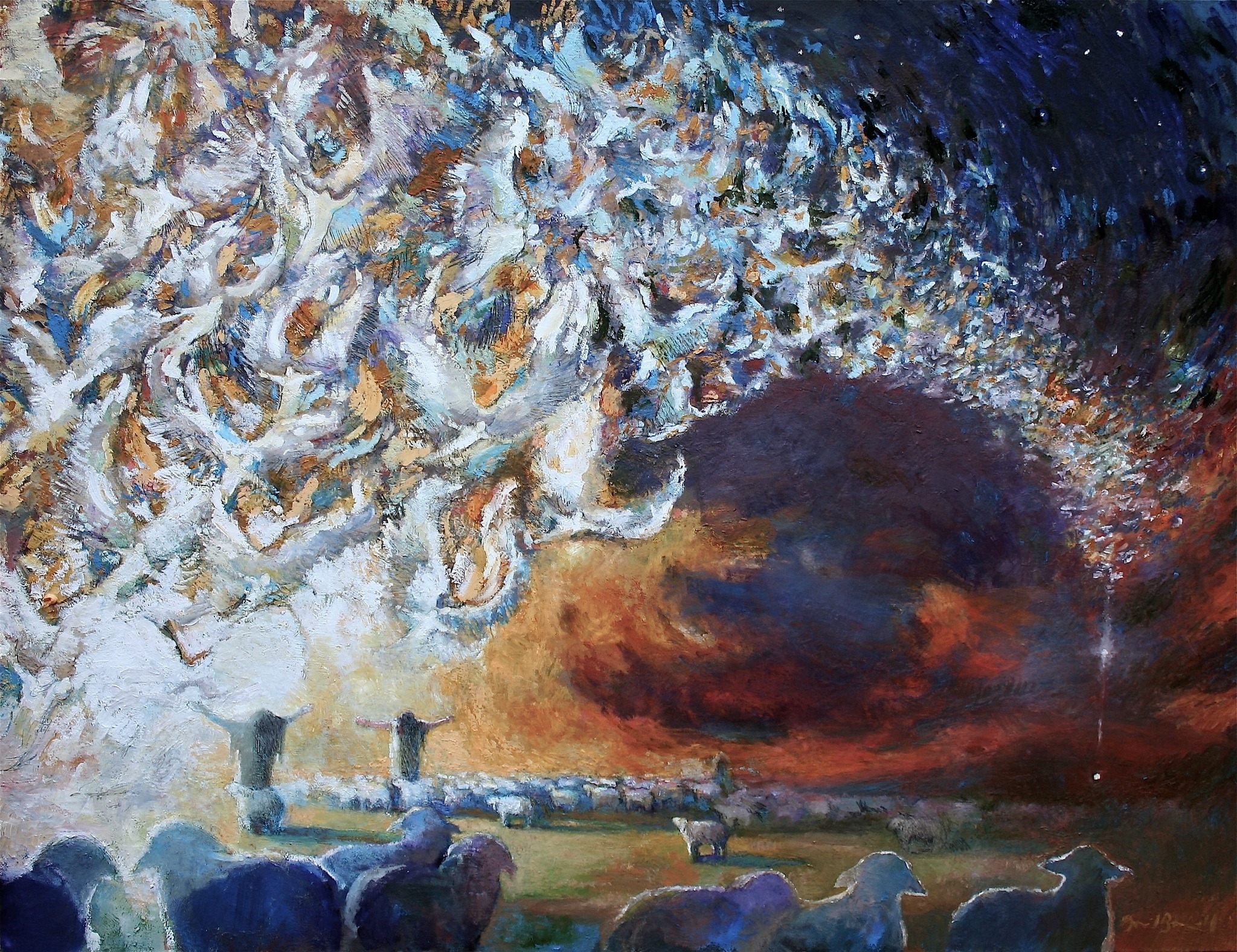– Aurelio Porfiri
A Church music director has to be aware of the correct use of musical instruments in the liturgy. Often this is one of the most problematic parts in Church music programs, because too many pastors allow the use of musical instruments that should not have a place in the liturgy.
Some people wonder if certain musical instruments are allowed or not. But the Church has already given some clear guidelines concerning this very topic. If we look at the seminal document by Saint Pius X from November 22, 1903 on sacred music, a Motu Proprio we mentioned already, we find in chapter VI this: “Although the music proper to the Church is purely vocal music, music with the accompaniment of the organ is also permitted. In some special cases, within due limits and with proper safeguards, other instruments may be allowed, but never without the special permission of the Ordinary, according to prescriptions of the Caeremoniale Episcoporum. As the singing should always have the principal place, the organ or other instruments should merely sustain and never oppress it. It is not permitted to have the chant preceded by long preludes or to interrupt it with intermezzo pieces. The sound of the organ as an accompaniment to the chant in preludes, interludes, and the like must be not only governed by the special nature of the instrument, but must participate in all the qualities proper to sacred music as above enumerated. The employment of the piano is forbidden in church, as is also that of noisy or frivolous instruments such as drums, cymbals, bells and the like. It is strictly forbidden to have bands play in church, and only in special cases with the consent of the Ordinary will it be permissible to admit wind instruments, limited in number, judiciously used, and proportioned to the size of the place provided the composition and accompaniment be written in grave and suitable style, and conform in all respects to that proper to the organ. In processions outside the church the Ordinary may give permission for a band, provided no profane pieces be executed. It would be desirable in such cases that the band confine itself to accompanying some spiritual canticle sung in Latin or in the vernacular by the singers and the pious associations which take part in the procession.”
The perspective is quite clear and it is important that a choir director understand that the musical instruments are under his care, because the first place is given to choral music a cappella and the organ is at the service of this. Other instruments may be allowed but with care and being very careful on musical instruments that have a strong profane association, as the piano or, we may say today, the guitar. I know that in our churches usually the problem is with the guitar, but we should be very clear about this: the guitar is a very noble musical instrument, but the way it is played in church is the same as that at a fancy party. If the guitar were played with the due artistry, maybe a certain use in some parts of the liturgy could be contemplated, but it is not the case of the 99% of people playing the guitar during the liturgy.
In Sacrosanctum Concilium, the Constitution that Vatican II has devoted to liturgy, we read: “In the Latin Church the pipe organ is to be held in high esteem, for it is the traditional musical instrument which adds a wonderful splendor to the Church’s ceremonies and powerfully lifts up man’s mind to God and to higher things. But other instruments also may be admitted for use in divine worship, with the knowledge and consent of the competent territorial authority, as laid down in Art. 22, 52, 37, and 40. This may be done, however, only on condition that the instruments are suitable, or can be made suitable, for sacred use, accord with the dignity of the temple, and truly contribute to the edification of the faithful.”
Here we can see that the directives are very clear on one hand but a little more abstract in the other. It is clear that the pipe organ is the musical instrument par excellence for the liturgy. It has always the place of honor and every effort should be made to train people in a way they can use the pipe organ. When speaking about musical instruments, the constitution is more vague respect the Motu Proprio, but the message is still clear and easily understandable: the musical instruments outside pipe organ should approved, suitable for the liturgy, for sacred use, in accord with the dignity of the temple and that contribute to the edification of the faithful.
Notice that it is said that it should be suitable or made suitable for the liturgy. What is the meaning of that? It means that they should at least be played in a way that detaches them from their profane use. And here we can see again the issue of the guitar, that is always played in the same way when accompanying sacred music or pop music.
But as we have said, the main instrument is the pipe organ. Of course we are aware that today not all churches can afford pipe organs. It is the hope that every church can afford to buy a real pipe organ, but when not possible there are digitals organ that, even if they are certainly not the same, can be a temporary surrogate for the real pipe organ. We are speaking of the digital organ that imitates the sound of real pipe organs, not the one that have other fancy instruments not associated with the liturgy.
If for the music in the liturgy the role of the choir director is important, the role of the organist is also fundamental. The playing of the organ connects and supports the different moments of the liturgy. The one that plays the organ should be able, so to speak, to breath with the liturgy itself, making in a way that what is achieved in the liturgy can resonate in every moment in the heart of the faithful. To do so should avoid the common mistake that is done when the organ is played by a pianist: using a single stop or register. In my experience in Asia, when going to Mass, I can immediately recognize that the person playing the organ is not an organist but a pianist, because he or she plays the instrument with a single register for the whole Mass.
Another common problem with the pianists playing the organ is not using the pedal, that is a distinctive feature of an organist. In the case of the pipe organ, not using the pedal feels weird, you can feel that something is missing. Of course I know that to use the pedal the player requires some training, but I think it is necessary to add depth to the sound of the pipe organ that is peculiar to this instrument.
Choir and organ are deeply connected. It should never be that the choir sings something while the organist play something else. The choir director and the organist (when they are not the same person) should always plan what kind of organ music should go with a particular song, in a way that there is no big difference in tonalities and dynamics.
Being able to accompany a choir singing is not easy, especially when the choir is not of a very high level. The organist should be able to adapt the playing to what the choir is doing, minimizing the possibility of mistakes, being able to anticipate in a millisecond the singing when there is a possibility that the choir may have problems with intonation, or leading the choir in cadences with a careful attention to the way they are singing. The organist is first and foremost a listener.
Then we need to emphasize the importance of improvisation for an organist. In cultures where creativity is not encouraged this may be a very big problem. But an organist that is not able to improvise is really missing something of a huge importance. Because the reality is that you cannot really “plan” a liturgy, the actual timing of what will be happening is unpredictable and so the space for the organ playing. So an organist not able to improvise will always be in great difficulty. You can hear immediately an organist that is not able to improvise, when after a sung piece he does not know what to play to fill the time remaining, and keep playing the same piece sung by the choir over and over without any change. In this case, for the overall shape of the sung liturgy, it is really a big problem.


 Follow
Follow

